1014 Cariboo teacher & the cowboy
Finding the Daydreamer
by Estella Kuchta
Laramie, Wyoming: Elm Books, 2020
$14.95 (U.S.) / 9781941614327
Reviewed by Ginny Ratsoy
*
 Vancouverite Estella Kuchta’s debut novel incorporates her academic interests in ecocriticism and the Canadian literary love story. Her American publishers call it “A tale of survival, set in the Canadian wilderness” (back cover) thereby placing it (intentionally or otherwise) in a Can Lit category popularized by Margaret Atwood’s (1972) Survival: A Thematic Guide to Canadian Literature.
Vancouverite Estella Kuchta’s debut novel incorporates her academic interests in ecocriticism and the Canadian literary love story. Her American publishers call it “A tale of survival, set in the Canadian wilderness” (back cover) thereby placing it (intentionally or otherwise) in a Can Lit category popularized by Margaret Atwood’s (1972) Survival: A Thematic Guide to Canadian Literature.
A short trip down memory lane and a refresher skimming of Survival yielded much applicable to ecocriticism and little in the category of love story. Granted, Can Lit has exploded in variety, quantity, and quality in the past half century, but I suspect Kuchta has hit on something worth pursuing – in both her novel and her research. Finding the Dreamer is a worthy addition to the vast Can Lit repository of literature about surviving in the wilds and the relatively scant Can Lit stock of literary love stories.
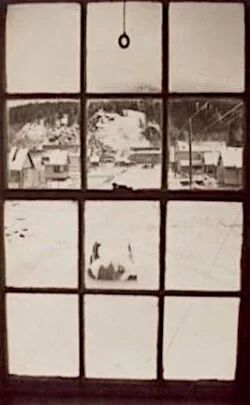
The novel opens at night, in the Depression, in the cold outdoors, somewhere north of Williams Lake, with young narrator/protagonist Annabelle and her three-year old, Katie, in hiding from Annabelle’s rancher husband Hugh, who is likely pursuing them and offering a reward for their return. The narrative quickly circles back to the ranch and the circumstances leading up to Annabelle’s departure. We learn that English-born Annabelle, whose father died when she was a child and whose mother eventually returned to England, moved from Vancouver to the Cariboo for a poorly paid teaching position and accepted Hugh’s proposal as much out of practicality as emotion: the security of land and food, as well as a husband deemed respectable by the community, even when the ranch wife must “assemble dinner with an absence of food and stitch a quilt without cloth” motivates her (p. 22).
A romantic and a dreamer, Annabelle is constitutionally ill-suited for the hard, lonely life, with its endless slog of cooking and cleaning for her taciturn husband and his workers, but she tolerates it even after she becomes attracted to Harvey, a charming cowboy. However, when she discovers Hugh has been sexually abusing teenaged ranch hands, and he then becomes physically abusive to her, Annabelle knows she and Katie must leave. With very little money and no concrete plans, besides the hopes of encountering Harvey and returning to Vancouver, she enlists the aid of Williams Lake storekeeper Ed, who pays a nameless travelling cowboy to temporarily supply them with a palomino and take them with him. And so begins a meandering journey that sees Annabelle and Katie (using the pseudonyms Ellen and Katrina) experience hardship, deprivation, and cruelty, but also the wonders of the natural world and the generosity of strangers.
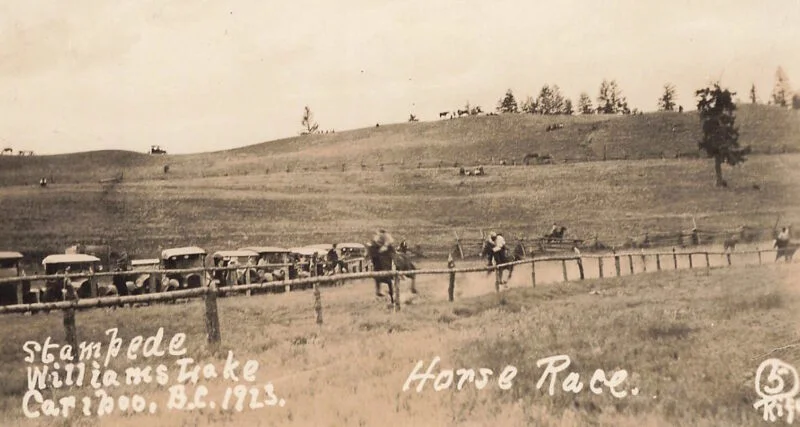
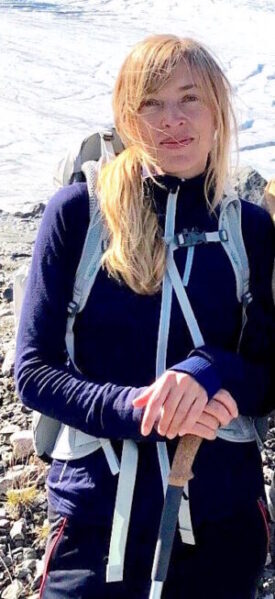
The cowboy deposits them to a camp adjacent to the Xat’sull reserve, where they are treated well. This setting is an education for Annabelle, who learns about the horrors of colonization, particularly the devastating effects of residential schools, from Mary, whose three children, when they do return home, are “like frightened rabbits” (p. 73).
However, the pair’s stay near Xat’sull terminates when two cowboys, apparently aware of Annabelle’s identity, come by. Mary advises Annabelle to go with them, as otherwise they are likely to report to Hugh to collect the reward. After trading half of her money and much of her valuables and provisions for a horse, Ocktoo, Annabelle agrees, and mother and daughter ride off with the duo toward 108 Mile House.
Upon arrival, Annabelle, exhausted, rents a room in a boarding house, where she finds work gardening to earn the train fare to Vancouver. However, she soon learns that the proprietor, Felix, runs a brothel out of the boarding house. When she approaches the bartender at the town tavern for leads on possible rides to Vancouver, Felix himself says he is going there. Trapped into selling Ocktoo to Felix for a paltry 50 cents and accompanying him by truck, Annabelle soon learns he is taking them to Lac La Hache — the wrong direction — and knows her identity.
When Felix pulls over to the side of the road for a pit stop, Annabelle and Katie flee into the night until they find a familiar creek. The forest proves friendly: after a night of sleep for Katie and dreaming of Harvey for Annabelle, the two stumble upon a cattle trail, and, not long after, a cattle dog accompanying two cowboys — Harvey and his cousin.
The men invite them along, feed them, and help them establish themselves in a shack, promising to protect them and bring food whenever they can. For a time, the romance Annabelle has yearned for blooms, particularly when she and Harvey have an extended time alone, sharing stories, “the first gifts of romance” (p. 137). Their shack amidst the beauty of nature is idyllic, mother and daughter agree.
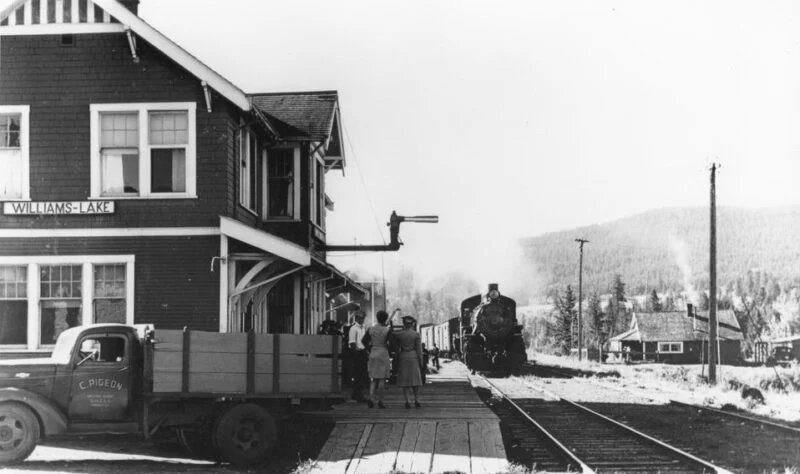
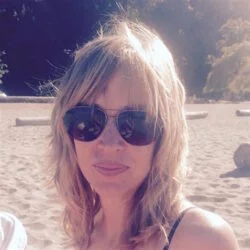
However, when Harvey’s visits become so infrequent that the pair has to fend for themselves, Annabelle becomes more resourceful (boiling fern fronds for sustenance and giving Katie a lesson in proper behaviour around bears, for example) and after a visit from Harvey gets somewhat physical, she senses that Hugh is dangerously close, recognizes her relationship with Harvey is likely to be short-lived, and finally asserts her independence. By confronting her husband and refusing to return to him, she achieves a sense of freedom. After a few days cooking for the rancher who employs Harvey, she gets a ride to town and buys two tickets for Whistler (as far as her money will take them).
While boarding the train, Annabelle has a mishap that will become her salvation. The novel ends, characteristically for a love story, but perhaps somewhat uncharacteristically for a tale of survival in the Canadian wilderness, with comfort and the promise of deep, mature love.
Into the rugged literary territory of by Sheila Watson’s classic The Double Hook (1959) and Richard Wagamese’s Starlight (2018) Estella Kuchta, with Finding the Daydreamer, has infused an unlikely romance — with delicacy and sentiment.
*
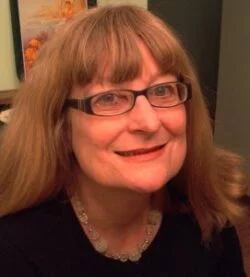
Recently retired after a 40-year career at Thompson Rivers University, Ginny Ratsoy writes, reads, and teaches in Kamloops. Her last pre-pandemic trip was to the Cariboo region, where she ate salmon, sat in on wonderful classes, encountered a sudden snowstorm, found the perfect cribbage board, and laughed all the way home with some fine colleagues. She has published articles on theatre, playwrights, and small cities in BC, and edited books, including Playing the Pacific Province: An Anthology of British Columbia Plays, 1967-2000 (Playwrights Canada Press, 2001, co-edited with James Hoffman); Theatre in British Columbia (Playwrights Canada Press, 2006); and, with W.F. Garrett-Petts and James Hoffman, Whose Culture Is It, Anyway? Community Engagement in Small Cities (New Star Books, 2014). Editor’s note: Ginny Ratsoy’s recent reviews include books by Madeline Sonik, Mary MacDonald, Lauren Soloy, Nick Tooke, Alix Ohlin, Natelle Fitzgerald, Steven Price, and Sarah Louise Butler.
*
The Ormsby Review. More Books. More Reviews. More Often.
Publisher and Editor: Richard Mackie
The Ormsby Review is a journal service for in-depth coverage of B.C. books and authors. The Advisory Board consists of Jean Barman, Robin Fisher, Cole Harris, Wade Davis, Hugh Johnston, Patricia Roy, David Stouck, and Graeme Wynn. Scholarly Patron: SFU Graduate Liberal Studies. Honorary Patron: Yosef Wosk. Provincial Government Patron since September 2018: Creative BC
“Only connect.” – E.M. Forster
One comment on “1014 Cariboo teacher & the cowboy”